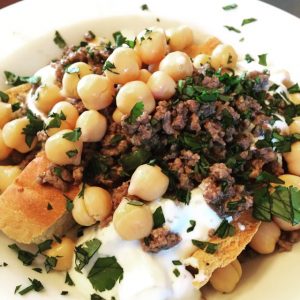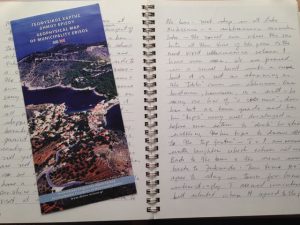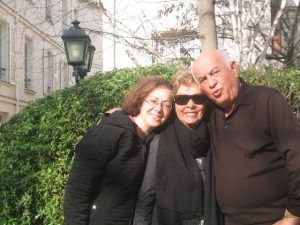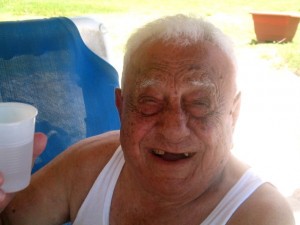Posts Tagged ‘keepsakes and memories’
An “Old Country” Family Favourite
Three days ago, I posted a photo of what I’d made for dinner on social media. It received likes, hearts, compliments, and requests for the recipe.
I’m pleased to share that recipe with you now albeit with hesitation.
Why?
Because I learned to cook from my mother and my grandmother and they didn’t use recipes!
And while I always use recipes for baking and sometimes for savoury dishes, my version of cooking is a little bit of this and a little bit of that and I wonder what this would taste like if I added that.
So take this more as a guideline for preparing Fateh al Laban (laban is the Arabic word for yogurt). Make the dish your own by experimenting with the proportions and the seasoning. There’s a vegetarian option, too, that Mom developed. I’ll describe that alternative after I’ve given you the details for preparing the traditional dish.
There are six components to Fateh: croutons, chickpeas, pine nuts, ground beef, yogurt, and herb garnish. I find it easiest to serve the components separately. Each diner can then assemble a plate according to their likes and dislikes. That also means the leftovers keep better than if they’ve been mixed together.
Croutons
Take two loaves of pita bread. Separate the halves of each loaf and tear them up into bite-sized pieces. Spread on a baking sheet covered with parchment paper and cook in a 350˚ oven until golden brown. Remove and set aside. Regular croutons will work but then you’ll miss out on the Lebanese look!
Chickpeas
Open a small can of chickpeas. Drain and rinse the chickpeas. Let them sit in a colander to dry until you’re ready to serve.
Pine Nuts
Fry a handful of pine nuts in butter until golden. Remove and set aside. Alternatively, mix them with a touch of olive oil and bake in a 350˚ oven until golden brown. Pine nuts burn easily, so check on them frequently if you have them in the oven. If you’re frying the pine nuts, turn off the heat just as the pine nuts begin to brown.
Ground Beef
I typically use .5 kilogram (1 pound) of lean or extra lean ground beef for two and that leaves a lot for leftovers. Fry the ground beef in a pan until cooked through. Season with salt, pepper, and allspice (no more than 15 ml, 1 teaspoon, of the latter). You can also add chopped jalapeño and a few drops of Worcestershire Sauce. Drain and keep at room temperature. As I’m writing this out, I realize that it would also work to mix the pine nuts in with the beef. I might try that next time.
Yogurt
Use approximately 250 ml (1 cup) of plain yogurt. It doesn’t matter which brand you choose or whether the yogurt is skim, 2%, or whole. I’d recommend the 2% or whole — just make sure it’s plain and not French Vanilla! In a mortar, crush 1/2-1 clove of garlic with salt, pepper, and a few, washed, shredded fresh mint leaves. Add the spiced garlic paste to the yogurt and mix thoroughly. You can also mix in diced cucumber to the yogurt mixture for an extra bite.
Garnish
Finely chop a green herb to use as garnish. I use cilantro because L. likes the flavour; parsley is the traditional option. You could also use mint or a combination of any or all three.
And that’s it. Seriously. Those are the components and once they’re ready to go, layer them in a bowl and dig in! I prefer to put the croutons on top rather than using them as a base so that they stay crunchy. If you place them under the yogurt, they get soggy pretty quickly.
Vegetarian Option
- Substitute boiled pasta — rotini or penne works best — for the croutons.
- Substitute broiled eggplant slices for the ground beef.
- Leave out the chickpeas.
- Mix all ingredients together to serve and garnish with chopped herbs.
Sahtain — bon appétit in Arabic — and let me know how your version of this dish works out.
For me, this dish is one of my comfort foods and L. loves it, too.
As with so many things, to share this dish with you is to share memories of Mom and to honour her legacy. Thanks for requesting the recipe.
A Life In Script
I feel the absence of my mother most keenly when I catch a glimpse of her writing.
When I look at the carefully crafted words and sentences she moulded; the ones she wrote down. An alchemy of thought, energy, effort, pen, and paper.
Mom used writing to express her thanks. To scold political leaders. To extend congratulations. To advocate for causes. To nurture connections.
She cherished the handwritten note even after her grandsons helped her learn to use email.
My mother believed there was a personal quality to a handwritten note that was impossible to replicate in type form. I agree. Each stroke of the pen captures a person’s personality, their character, history, and experience. The way in which hand-written words create a web of meaning is the most affirmative statement of “I am here”. When I catch sight of my mother’s writing script I wonder how it is that she is not here.
How can the person whose heart propelled the pen across the page not be here to cross that t and dot that i?
I feel the absence of my mother most keenly when I see her writing, with an intake of breath and a vise clamped around my heart.
My mother’s script is from an earlier era when education had not been commodified and contorted. When it was a gift to learn. A time when writing was valued not only for its content but for its form. When penmanship spoke of culture and education and, yes, privilege.
That script, her unique cursive style, is undeniably and uniquely my mother, Yulanda.
I feel the absence of my mother most profoundly when I stare at her writing.
René Descartes said, “I am thinking, therefore I am.” My mother’s cursive script says, “I wrote, therefore I have been.” And as the ability to recall her physical presence becomes the dream of time lapsed, her writing will remain forever real and tangible.
As her daughters, her children, and perhaps someday her grandchildren and descendants, we will carry her DNA forward in time. However, her letters, the drafts of her speeches, the thank-you cards, her recipes, the quotations she noted down, her signature — like the one in the volume of William Shakespeare’s collected works that she used for her studies at McGill — these all serve as a testament to her personal spirit.
No other hand shaped those words, no other mind developed those ideas, no one else forged those connections: letter to letter, person to person, heart to heart.
I feel the absence of my mother most keenly when I catch a glimpse of her writing. The words and sentences that flowed from the pen she held, the pen she guided into forever.
In the year and months since my mother died (and a month before what would have been her 79th birthday), my family has cried, laughed, and celebrated birthdays, anniversaries, graduations, and weddings. We’ve attended funerals. We’ve had time at home, we’ve been away together and separately. Time has carried us forward. It is life’s imperative.
And she, my mother, has been there with us. In each moment, in each thought, in each word.
She always will be.
“If we danced more and sang more, we’d be happier people.”
Yulanda M. Faris
July 2, 1937 – April 23, 2015
Getting to Know Me and You
In a recent blog post, Chris Kennedy, Superintendent of Schools for West Vancouver, issued a challenge which involves providing 11 random facts about one’s self, answering 11 questions, and posing 11 questions for others to answer.
I don’t have an athlete’s competitive gene in the way Chris does, but I’m not one to pass up a challenge — particularly one which offers an easy way into kickstarting my blog for the year.
So here goes:
11 Facts About Me
- I’m the eldest child in my family and I use birth order psychology to rationalize my tendency to be bossy.
- Athletic competition is not my forte, but I was a competitive swimmer when I was younger.
- And while I may not be an athlete, my competitive instincts do tend to arise if faced with a New York Times crossword puzzle, a game of Trivial Pursuit, or any sort of game involving my five nephews.
- I was one of the original hosting staff hired for Expo 86 in Vancouver. I worked in the pre-fair period, first at the display pavilion conducting tours of the site model, and later at the Expo Centre which eventually became Science World.
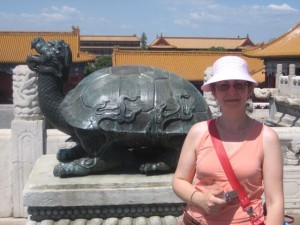
- Although I did have that experience with Expo, I resigned my position before the Fair actually opened – not one of the best decisions I’ve ever made.
- I lived in Toronto from 1986 to 1992 and worked for a variety of companies including Addison Wesley Publishers, Canada Mortgage and Housing Corporation, and Rogers Cablesystems. I also obtained my MBA from the University of Toronto while there.
- During my time in Toronto, I took creative writing lessons through the Continuing Education department at the U of T. My instructor, for two terms, was Anne Michaels who subsequently found much acclaim with the publication of her novel Fugitive Pieces among other works.
- I still have the letter Ms. Michaels wrote to me at the end of one term (she wrote a letter for to each student) encouraging me to give myself the gift of time to write. I have to admit, I’ve never quite learned how to do so, but I still may.
- While working for CMHC, I was seconded to the G8 1988 Economic Summit and worked in the media centre. I think I may have caught a glimpse of Margaret Thatcher once from a very great distance!
- My return to Vancouver in 1992 was prompted by a number of factors, primarily the impending birth of my first nephew. That’s one of the best decisions I’ve ever made because it brought me back home and allowed me to play a bigger part in his life, and the lives of his brothers, than I may have been able to from far away.
- September 2014 will mark 40 years since my family moved to British Columbia and settled in West Vancouver.
Questions from Chris Kennedy:
- If you could only watch one television station what would it be? CBC Newsworld
- Looking back at your schooling, what was the silliest rule your school had? I don’t remember which is probably a clear indication that school rules aren’t as effective as we’d like them to be. Or it may only be evidence of my memory issues!
- Who is the greatest ever Canuck? I’m sure I’d answer this differently every day and we’re lucky to have so many choices. Today I’m going to pick Lester B. Pearson because I believe he was a man who had a vision of how Canada could operate on the world stage in a manner which promoted peace and reconciliation. Our political leadership now seems to have abdicated that position. [Editor’s Note: I realize now Chris meant the hockey team and not Canadians in general in which case I’ll say Trevor Linden although I was also a Harold Snepsts fan. Oh, and Kirk McLean.]
- What is the greatest rock group of the 1980s? Please see the note above re memory issues. I was a Fleetwood Mac enthusiast and also a fan of the Little River Band, but I think that may have been more reflective of the 1970s.
- What is something education related you have changed your opinion on over your career? Assessment although not necessarily academic honours and awards.
- What is the warmest place you have ever been — and how warm was it? China in July 2009. My eyeglasses would fog up as soon as a I stepped out of the hotel lobby and I remember being drenched in perspiration from morning to evening.
- Poorest fashion trend you have seen in schools in the last 10 years? Ugh to Uggs.
- What was more frustrating to deal with in your school — Pokemon cards or silly bands? Luckily my role precluded the need to deal with this issue.
- Describe your favourite high school teacher in four words. Miss Lysell: dramatist extraordinaire inspiring imaginations.
- What is the best reason to go on Facebook at least once a day? For a smile while refreshing connections with friends and family, near and far.
- If blogging was outlawed tomorrow — what would be your reaction? Phew!
11 Random Questions for You:
- When you think back to your time as an elementary and/or high school student, what’s the one thing you wish had been done differently?
- What’s your favourite movie and why?
- If you were asked for one piece of advice to offer a first year student at a post-secondary institution, what would it be?
- What was your favourite song of 2013 and why?
- Who would you say serves as the best role model for young people today?
- Think about the work you’re doing now. Is it part of a career you had planned on or are you doing something you had never thought of doing when you were younger?
- If you could pitch an idea for a television show, what would it be? (Credit for this question goes to my son!)
- On a sunny day, do you make every effort to get outside or do you sometimes prefer to stay at home?
- If you had to choose one animal to best describe who you are, what would it be? (I was once asked this question in a job interview!)
- What do you think is one thing we could do to encourage more young people to vote in municipal, provincial, and federal elections?
- What is one change you hope to make in 2014?
I Challenge the Following People to do their “Homework”:
As Chris did, I extend the challenge of this activity to the educational community in the West Vancouver School District including parents and students who write and maintain blogs. I’d also like to extend the challenge to Trustees throughout British Columbia. It’s an interesting way to allow our communities to get to know us just that little bit better beyond our role as advocates for the public education system.
To The Graduating Class of 2013
My remarks to the Sentinel Secondary School graduating class of 2013. Another version of this presentation was delivered to the Rockridge graduating class on May 17, 2013. This is a full transcript of my words and as is typical with verbal presentations, adjustments and/or changes may have been made while speaking.
Thank you. Merci.
I’m so pleased to be here tonight. Je suis très heureuse d’être ici avec vous ce soir.
On behalf of the West Van Board of Education, my congratulations to all this year’s graduates. Félicitations!
I know many of you are wondering who is this talking head and why does she get to speak at my grad?
Well, in the November 2011 municipal elections I and four others were elected by West Van residents to serve as Trustees on the Board of Education.
That means my colleagues and I help to oversee the public education system in our community and that along with your teachers, the staff at the school and the district, parents and yourselves, we have a measure of responsibility and accountability for your education from kindergarten through to Grade 12.
I also happen to be a graduate of school district 45.
Even though I’ve been around the District on and off since I was twelve, and even though I’ve been to Sentinel a number of times, I wanted to get a better feel for the school and its students before I spoke tonight.
I phoned up Principal Mike Finch and asked if we could tour the school together. And we did. I got to see some of you at work and some of you at play. I had a look into many of the classrooms and then I asked Mr. Finch to tell me about you, to tell me about students at Sentinel.
I’m just gonna give you a moment to think about what he told me.
No, he didn’t say that. Oh, he’d never say that, would he? No way. Uhuh.
What he did tell me is how impressed he has been by the students at Sentinel. How dedicated you are and how motivated you are to succeed on your own terms whether you’re studying French, pursuing your athletic interests in the academies, or being super achievers.
Barb Sunday, one of your amazing art leaders told me during my visit to the school, that she’d sent off about 50 advanced placement art portfolios for consideration. 50! And if you stop by the Ferry Building Gallery at the foot of 14th Street, you’ll see some of that art on display.
What you’ll also see there is the commitment you’ve made to pursuing your passions and the care you’ve taken to excel in the work you do.
And tonight we’re here to celebrate your accomplishments.
For parents, it’s a bittersweet moment, likely tinged with a sense of relief! Tonight is a chance to celebrate the wonderful individuals you’ve become and yet we also have to be prepared to let you go.
That’s what parents do.
And like parents, the teachers, the administration, and all the staff of the West Van school district – even Trustees, we all have to do our best to make sure you grads have the skills and talents you need to continue to succeed. And now you’re moving on.
But it’s not easy as parents or teachers or administrators to let you go because we know that the journey can sometimes be a challenge.
I would like to share with you some words by the Lebanese poet Kahlil Gibran. In his poem on children, he writes:
Your children are not your children.
They are the sons and daughters of Life’s longing for itself.
They come through you but not from you,
And though they are with you yet they belong not to you.
You may give them your love but not your thoughts,
For they have their own thoughts.
You may house their bodies but not their souls,
For their souls dwell in the house of tomorrow, which you cannot visit, not even in your dreams.
As Gibran says, you, our graduates, you live in tomorrow and we are not here to stand in your way.
You’ve worked hard or maybe you haven’t. You’ve had good days and bad. You’ve made friends, you’ve lost friends. You’ve studied, you’ve learned. You’ve been on a journey and now you’re set for the next stage of life whatever that may be for you.
And what do you need to successfully navigate what’s ahead?
To borrow the words of Canadian musicians David Myles and Classified, you need to embrace your inner ninja.
Be fierce and determined and passionate. Dream big and take action.
Stand up for yourself. More importantly, stand up for others.
Stand up for what you believe. More importantly, be tolerant and allow others to speak up for what they believe.
Stand up for what is right. More importantly, be open to different views and adjust your ideas if warranted.
And finally, Sentinel grads, take all that we — the community, the school District, the administration, your teachers, and your parents — take all that we have given you, take all that you are, and make the world you are inheriting, make it better.
Make the world better for you, for me, and for those who have so much less than either of us.
I know you can do it. I know you can do it.
Thank you and bonne chance!
Remembering
My maternal grandfather, Mr. Mike as he was known, passed away in 2008 at the age of 104. Yesterday, October 9th, would have been his birthday. These are the words I spoke at his funeral four years ago.
“As you can see, I’ve written a book. But, before I start, let me say one thing. Looking around at this incredible gathering, the one person I know who’s having the time of his life, wherever he may be, is Michael Khaleel George Azan.
My name is Reema and I’m Mr. Mike’s granddaughter. My mother is Y., Miss U as she’s known in Spaldings.
I hope, as C. and I speak, you’ll hear the echo of the many voices speaking with us today, the voices of all Mr. Mike’s grandchildren and great-grandchildren.
When I asked my 7-year old son what he remembers most about Grandpa Mike, he answered: “He was very old and he sat a lot.”
I know how lucky my son is to have known his great-grandfather well enough to have memories of him.
But I’m sad he didn’t know Mr. Mike the way my cousins and I did.
Mr. Mike, until recently, was not a guy who sat a lot: he loved to move, he was loud, he was vivacious, passionate, strong, loud, he loved to travel, he was loving, full of energy, brimming with confidence, and … loud.
Grandpa Mike was a force of nature and it seems only fitting that we remember him today, September 10th, which I’ve read is the peak day of hurricane season.
He was a man of the earth. Born in Lebanon and living in poverty, he once told me he “walked four year barefooted.” His footprints are embedded in the very soil of our world: in Europe as he made his way to his new island home in 1922, in Jamaica – his home for 86 years, or in Canada and the United States where he visited family.
He was a man who enjoyed the bounty of the earth. If there ever was a man who gloried in the pleasure of food – and was deeply thankful for every mouthful – it was Mr. Mike.
In the morning, he would have a glass of water, a cup of hot strong coffee and two bananas. And that was before breakfast. My cousin D. remembers him in the kitchen, in his white undershirt, mixing Fatoosh, a Lebanese salad, in a huge aluminum bowl to feed members of the family who would gather around the tables set end to end to accommodate everyone.
On Friday nights, Uncle V.’s family would travel up to Spaldings for dinner. V.’s son remembers how Grandpa Mike made him feel special by making sure that even as a child he was included in the conversation.
It was that ability to make people feel special that made Grandpa Mike such an expert salesman, or as my cousin G. says, “he could sell water to a fish in a pond”.
No one who knew Mr. Mike could deny that he had fire in him. You know that if there was music, it wouldn’t be long before he’d get up to dance.
At his 100th birthday celebration, my sister remembers how his eyes twinkled as he watched a belly dancer perform. When he tried to join her, his children urged him to remain seated. He shrugged them off, got up to dance, twirling his white handkerchief around and around.
Mr. Mike loved his family fiercely, and he had a temper, one that chased many a customer out of his store.
I remember visiting Jamaica as a young girl of 11 and being utterly fascinated by the store. I remember it as a dim cavern of treasures: men’s fabrics, women’s fabrics, cotton panties, housewares, lace, thread, mixing bowls, brooms, ribbon, and buttons.
My favourite part of the store was the mezzanine where there were boxes and boxes of shoes, some easily twenty years old.
I remember the magic of the place: it was a dragon’s den and Mr. Mike was the fire-breathing guardian. He used his voice to bellow his disapproval, and my cousin D. remembers that he also used brooms, pots and pans, and even shoes which he threw down the street after the people running away.
Mr. Mike was so physically strong. My cousin L. remembers his “hugs were so tight you thought he broke a rib and the kisses that were so hard, I swore his beard cut my face open.”
He was also a man of beliefs. The essence of his philosophy, as described by my cousin S., was his love of God, his love of family, and his love of friends.
I believe that part of Mr. Mike’s longevity was his innate curiosity about the world and an appreciation for all the things in it. This is a man who had no formal learning, but he was always asking questions.
And he never seemed to forget a thing. I once asked him to tell me about Spaldings when he first arrived. According to the notes I made, here’s some of what he told me: “Eggs was 6 pence a dozen, meat was 6 pence a pound. A big loaf of bread was 9 pence. 9 pence was money.”
Earth. Fire. Air. These, according to ancient philosophers, are considered the principal elements of nature along with water. I like to think of life as a river. You’ve got to jump in and go with the flow.
Most of us are tempted to reach out and grab a branch or a log to get to safety. Not Mr. Mike.
I believe he was fully immersed in the river of life and trusted the current to carry him.
The word hero is thrown around a lot in our world. But sometimes I think the most extraordinary people amongst us, the true heroes, are those like Mr. Mike, who live in contentment, who take joy in their family and friends, and who work on behalf of their community. Who ride the ups and downs of life, who take the good with the bad, and who smile every day.
Mr. Mike used his voice to share his stories with all of us. Sadly, we’ve lost that voice. He didn’t have the ability to capture those stories with words on a page, but he had pictures. He was obsessive about pictures. I think that’s because they were his diary, his journal, his testament. He could look at them and say: “I’m a good man. I’ve lived a good life. These are the ones I love and this is my life’s work.”
We are his life’s work: his children, his grandchildren, his great-grandchildren. And to him we were – we are – masterpieces. Flaws and all. And, if we’re smart enough, and if we love enough, as we go about our daily lives, we will hear the echo of his footsteps, the echo of his voice, and we will feel the echo of his arms around us, and the echo of his heartbeat, here, inside each and every one of us.”
